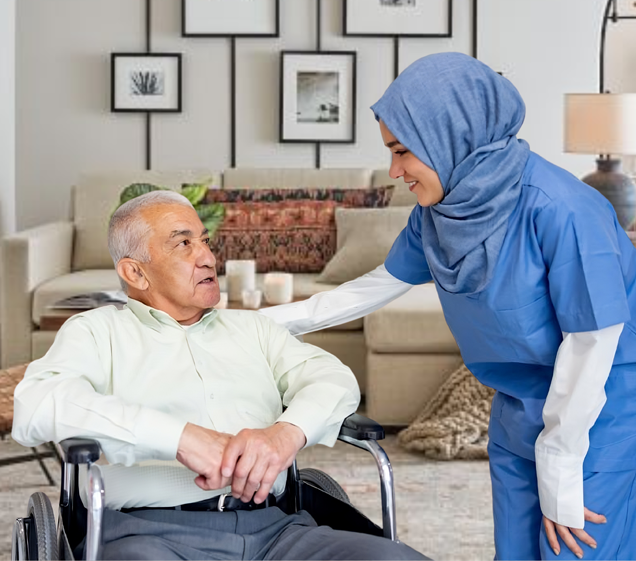Post Operative Care at Home After Cosmetic Surgery
Cosmetic surgery has become increasingly popular as people seek to enhance their appearance and boost their confidence. However, the success of any cosmetic procedure depends not only on the surgery itself but also on the post-operative care that follows. Proper home care is essential for a smooth recovery, minimizing complications, and achieving optimal results. This article outlines key guidelines for managing post-operative care at home effectively.
Creating a Comfortable Recovery Environment:
Before undergoing surgery at Post Operative Care at Home in Dubai (رعاية ما بعد الجراحة في المنزل في دبي) , it's important to prepare your home to ensure a calm, safe, and healing environment. Designate a specific area in your home where you can rest without disruptions. This space should be clean, quiet, and stocked with essentials such as extra pillows, soft blankets, water, healthy snacks, prescribed medications, and entertainment like books or a tablet. Make sure frequently used items are within arm's reach to avoid unnecessary movement. If possible, arrange for someone to assist you during the first few days, as you may need help with basic activities.

Following Medication and Wound Care Instructions:
Post-operative recovery typically involves managing pain, preventing infection, and caring for surgical wounds. Carefully follow the medication schedule provided, including antibiotics, pain relievers, and any topical ointments. Even if you feel better, do not skip doses. Keep surgical wounds clean and dry as instructed. Use sterile dressings when required and change them regularly with clean hands. Avoid touching the area unnecessarily, and do not apply any products not recommended for healing. Monitoring for signs of infection—such as redness, unusual swelling, warmth, or discharge—is vital, and you should seek professional advice if they occur.
Managing Swelling, Bruising, and Discomfort:
Swelling and bruising are common after cosmetic procedures and typically subside within a few weeks. Applying cold compresses as instructed during the initial days can help reduce swelling and provide relief. Keep your head elevated while sleeping, especially if you have had facial or upper body surgery, to aid in fluid drainage. Avoid tight clothing or accessories that may irritate or compress the treated area. Wear compression garments if recommended, as they support healing and reduce fluid build-up. Resting frequently and avoiding strenuous activities are crucial during the initial phase of healing.
Staying Hydrated and Eating Nutritious Foods:
Nutrition plays a key role in recovery. Eating a well-balanced diet rich in vitamins, minerals, and protein helps repair tissue, boost immunity, and improve energy levels. Include plenty of fruits, vegetables, lean meats, whole grains, and healthy fats in your meals. Staying hydrated by drinking plenty of water supports overall bodily functions and helps flush out toxins from the body. Avoid alcohol and limit caffeine intake, especially while taking medications. If nausea is an issue, stick to small, bland meals and gradually reintroduce solid foods as tolerated.
Maintaining Gentle Physical Activity:
While rest is essential after surgery, light movement can promote circulation and prevent complications such as blood clots. Gentle walks around your home or mild stretching (if allowed) can enhance blood flow and reduce stiffness. Avoid lifting heavy objects, bending over, or any vigorous activity until you receive clearance. Gradually increase your level of activity as your body heals. It's important to listen to your body and not push beyond your comfort zone. Overexertion during the recovery phase can lead to setbacks and prolong healing time.
Monitoring Emotional Well-being:
Recovery isn't only physical—emotional well-being is equally important. After cosmetic surgery, it's normal to experience a range of emotions including excitement, impatience, anxiety, or even mild sadness. Swelling and bruising can temporarily mask the final results, which may affect self-image in the early stages. Practice patience and maintain a positive outlook, knowing that healing takes time. Staying connected with loved ones, engaging in light activities you enjoy, and practicing mindfulness or relaxation techniques can help manage stress and boost your mood.
Attending Follow-Up Appointments and Staying Informed:
Even when recovering at home, staying connected with your surgical team through scheduled follow-ups is essential. These check-ins help ensure that your recovery is on track and allow for early detection of any issues. Take notes of your recovery progress, and don't hesitate to ask questions or report unusual symptoms. Keeping a journal of your physical and emotional changes can be helpful. Remember, the results of cosmetic surgery become more apparent over time, and patience is key. Understanding the recovery process and staying informed helps you remain engaged and proactive in your healing journey.
Conclusion:
Post-operative care at home plays a vital role in the success of cosmetic surgery. With proper preparation, disciplined wound care, balanced nutrition, and emotional awareness, the recovery process can be smooth and rewarding. By listening to your body, following professional advice, and giving yourself the time and space to heal, you significantly increase the likelihood of achieving your desired results. Each recovery journey is unique, so be kind to yourself and allow your body the rest and care it needs.
